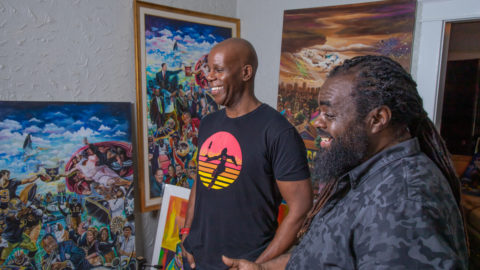How to be more you, at work
Advice on how to bring what you love into your work and change what you don’t
Building your career is a journey filled with challenges, excitement, and forks in the road. And journeys are easier with maps. In this column, job experts answer your questions and deliver advice to help you take the next step.
Question: I hear there are people who can’t wait to go to work every morning. Tell me how I can be one of these mythical creatures.
Answer: On average, we spend 80,000 hours of our lives at work. We’ve all heard that finding work that you are passionate about is a key ingredient to a fulfilling life.
But how do you find “the thing”?
Mike McCarter, who works in Microsoft’s vetting and forensic services protecting the company and its customers from risks, is somewhat of a “find your passion” expert.
A few years ago, McCarter felt stuck in his job. He needed more freedom and creativity, and he wanted to make a difference—in his own way. McCarter weighed his options and decided to make a change. “I’ve realized that life is too short to defer one’s calling,” said McCarter.
Today, McCarter is a team director who has completely transformed the way he and his team work to focus on lean hacking (experimenting with new ideas and testing them—quickly).
“I’ve heard from many people on our team that their jobs are more than just jobs—they have real meaning. I think this is due to our hacking culture and our willingness to let people pursue their passions,” he said.
While lean hacking may not be the “the thing” for everyone, McCarter’s process to figure out what makes him tick and then inject passion into his work could work for you, too—whether you are at your dream job or on your way there.
Know thyself
There is no way to find your passion if you haven’t found yourself, advises McCarter.
McCarter found mindfulness exercises extremely helpful in locating his personal operating system.
“Close your eyes and breathe. Focus on the five or six people you care most about in the world. Picture yourself at your 90th birthday party . . . your loved ones are toasting you, describing your impact on their lives. What are they saying about you?” This can help you define your personal philosophy.”
McCarter suggests that you ask yourself a series of questions:
1. What are my unique strengths?
2. What do I care most about in the world?
3. What am I doing when I lose all track of time?
4. What am I feeling called to do with my time at this job and on this planet?
Be brutally honest and as specific as possible. Everyone loves their family; dig deeper, he says.
The answers will not necessarily reveal your hidden passion, but McCarter says they might uncover a hidden kernel of wisdom.
For instance, you may be totally engrossed in analyzing data and discovering insights that no one else has found, but that doesn’t have to limit your career choices solely to being a data analyst. Look beyond the tasks that currently occupy your time, and you’ll find that your brain is fascinated by puzzles and patterns—that it’s capable of so much more.
“What if the world around you becomes your Excel spreadsheet?” McCarter asks. “Now, you might find those insights buried in conversations with coworkers or in meetings with customers.”
Learn how you operate. Are you an introvert or an extrovert? Learn what it is that will cause you to speak up when you’d typically not chime in.
These questions and answers should help steer your passion ship in the right direction.
Speak your truth
After you’re honest with yourself about what makes you tick, it might be time to be honest with others, McCarter suggests.
When McCarter was ready to leave his job four years ago to launch a startup, he had a frank conversation with his manager that opened new possibilities he hadn’t considered. “Her response caught me off guard.”
If you aren’t feeling the stretch into interesting and maybe uncomfortable new areas, if you aren’t growing or enjoying your work, McCarter suggests being transparent with your manager and opening up to those who could help.
“You always have the power to change your own perspectives.”
Make time to talk with key people in your networks—mentors and peers—about how you’re feeling, what you’re deeply interested in, and where you think your path might be headed. Open up about your passion, and be ready to receive sage advice and helpful suggestions.
Take action
Once you locate something inside of you that feels right, it’s time to put an action plan into place. Even when it comes to career development, McCarter brings his passion for lean hacking (using low-cost, easily available solutions) and Hack for Good to his approach—he says that Hack for Good is the main reason that he feels like his job is more than just a job.
For McCarter, the first step in his action plan was to incorporate this hacking more formally into his job. He gathered a team and signed up for Microsoft’s global Hackathon—and has done so for the past four years. He and his team also host smaller events like “Hack Fridays,” as well as half-day hack events, and they are now tightly imbedded within the Hack for Good community at Microsoft with multiple humanitarian projects running at any given time.
“I’m big on the benevolent flywheel effect that happens when people stretch into areas they’re passionate about,” said McCarter. “Even if the hack doesn’t directly apply to your job, the impacts you create and the skills you build when hacking will give you (and the people around you) more energy when you head back to your day job.”
You could also prioritize your passion by signing up for a class, reading books in your field, and finding someone who could guide you through your journey.
Then, take time each day and week to celebrate wins, appreciate the contributions of people around you, and talk openly about mistakes. McCarter and his team celebrate failures by recognizing the risk-taking that led to them, discussing the lessons learned from them, and affirming the courage to share them publicly.
Above all else, take the initiative to change what isn’t working. From switching up your physical workspace to entering into uncomfortable conversations about your happiness or goals, McCarter suggests that you get hands on in order to craft the job you want.
In short, like the quote from author Mark Batterson that appears on McCarter’s team board says, “We need to start playing offense with our lives. The world needs more daring people with daring plans.”



















